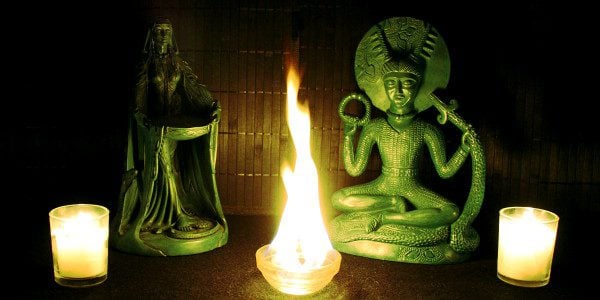Contrary to what some have suggested, the last post Monotheist, New Age, and Materialist Derailments of Polytheism wasn’t written to tell our detractors to sit down and shut up. Certainly I hope they’ll examine the case and be mindful of the context of polytheist discussions, but I wasn’t writing only to them.
I was also writing for us, the polytheist community. This is the environment in which we work. It’s not fair and it’s not nice, but it is what it is. We don’t have to like it, but we do have to deal with it.
Several people have asked if the last post was about definitions. I understand how they might think that – there were certainly enough definitions in it. But that post wasn’t arguing for one definition over another. Rather, it was listing these definitions and calling attention to their prevalence in the mainstream culture.
Ask the average person on the street about “God” and they assume you’re talking about the old man in the sky with the long white beard who’s ready and willing to smite you for not following his many arbitrary rules. Even if you’re speaking with a more educated, more sophisticated person, they’ll likely assume you mean the God of Christianity. One of my biggest complaints with Richard Dawkins is how he defines “God” and “religion” very narrowly, using definitions taken straight from conservative monotheists.
And if they’ve moved beyond that, they’ll likely have a definition of “God” similar to the many New Age examples I listed.
These are the words we hear all the time. These are the arguments we encounter. These are the assumptions we have to deal with. Even if we try to ignore them, our subconscious doesn’t. Our subconscious hears them and assumes there’s something to them. They become part of us, and if we are not very mindful and very careful, they will have a negative impact on our polytheism and on our entire lives.
We’re trying to restore – or re-create, or reimagine: choose your favorite term – polytheism in a world where the loudest voices scream there is only one God and the second loudest voices scream there are none. We can’t put on headphones and block them out. So what can we do?
Be aware. “Pay no attention to the man behind the curtain!” No, see him for who and what he is. Learn to recognize monotheistic and non-theistic language when you hear it. Spot the biblical references when they appear in ordinary conversation – the King James Bible is still the best selling English book in history. That’s not altogether a bad thing – so long as you don’t read it literally – but it’s diametrically opposed to polytheism, even though a plain reading affirms the existence of many Gods.
Be aware when you’re inclined to write off your mystical experiences as “just your emotions” or “just brain chemistry.” Certainly emotions and brain chemistry are involved, but there’s a lot more going on than that.
Be aware than many Christians, Muslims, and atheists consider it their sacred duty to convert you to their way of thinking. Not all, but a lot. That’s no reason why you can’t be friends, but it’s plenty of reason to examine every religious comment they make rather than accepting it on face value.
Practice. There is nothing you can do to counter a negative environment more effectively than practicing your polytheism on a regular basis. If you already have a strong religious identity, it’s much harder for either proselytizers or the mainstream culture to pull you over to their side.
Earlier this year I put a together a brief guide on Beginning a Devotional Practice. Create an altar. Pray. Mediate. Make offerings. Talk to the Gods regularly and listen for Their replies. There are many ways to do devotion, but there is no substitute for a consistent, reverent, devotional practice.
Remember that our polytheist traditions are about many things, but at the top of that list are the relationships we form and strengthen through hospitality and reciprocity.
Read. There are many good polytheist bloggers who are worthy of your time, but it’s best to build a strong foundation in the classics. Read the works of the Greek philosophers. I don’t agree with all of them all the time, but they wrote in an era where polytheism was a given. Read the stories of our ancient ancestors. Even if they weren’t written down until the Christian era, they still help us understand what it was like to live in a world full of Gods. Learn about the cultures that still have an unbroken tradition of polytheism. Few of them are in the West – that just means you’ll have to look a little harder to find them.
If you have a steady diet of polytheist ideas, eventually you’ll crowd out the monotheist, New Age, and materialist ideas.
Practice with a group. It’s hard to build a strong religious identity as a solitary practitioner. Oh, there are some people who do it, but they’re the exception – and I’m not one of them. As meaningful and helpful as it is to stand before your altar and pour offerings to Cernunnos or Brighid or Auset, it’s that much more meaningful to do it in a group. My few attempts at doing an ecstatic possession ritual solo did not go well. The times I’ve done it in a group setting have been among the most powerful experiences of my life.
And if you practice with a group, you’ll soon find that you don’t agree with everyone… and you’ll figure out what’s an important distinction and what really doesn’t matter.
This is the environment in which we work. These are the ideas, concepts, and language we hear on a daily basis. These are the challenges to our polytheism. We can’t make them go away, but we can deal with them effectively. When we do, we strengthen our relationships with our Gods, ancestors, and spirits, and we grow stronger and more confident in our polytheism.


















